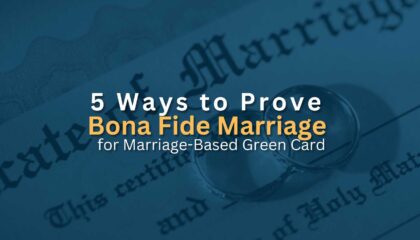Comprehensive Guide to U.S. Citizenship through Naturalization (N-400)

Table of Contents
Introduction
Applying to become a U.S. citizen through naturalization is the legal process by which individuals who weren’t born in the United States can achieve the honored status of U.S. citizenship. This process represents a momentous step, providing individuals with the full rights and obligations of American citizenship, such as the right to vote in local, state, and federal elections. Naturalization is essentially the finish line to many immigrants. In this short guide, we will detail the path to U.S. citizenship through naturalization, detail the application process, explain eligibility requirements, as well as the necessary forms required and USCIS filing fees.
Who Is Eligible for Citizenship / Naturalization?
In most instances, lawful permanent residents (commonly known as green card holders) who’ve satisfied specific residency and eligibility conditions qualify to apply for U.S. citizenship through naturalization. The key eligibility requirements include the maintenance of continuous residence in the United States, a demonstration of good moral character, and proficiency in speaking, reading, and writing English.
What are the Eligibility Requirements for U.S. Citizenship through Naturalization?
To secure U.S. citizenship through naturalization, applicants must meet the following conditions:
- Minimum Age: You must be at least 18 years old;
- Permanent Residence: You must be a lawful permanent resident (green card holder) for at least 5 years (3 years if permanent residence is through marriage);
- Continuous Residence & Physical Presence: Applicants must show that they have continuously resided in the U.S. Any trips outside the U.S. that last more than 6 months could interrupt the applicant’s claim that they continually resided in the United States through the duration of their permanent residency.
- Demonstrate Good Moral Character: Applicants must demonstrate that they are a person of good moral character. If an applicant previously owes taxes or has a criminal history, that will need to be disclosed, even if the record is expunged or it did not result in a conviction.
- English Language Proficiency: Applicants must be proficient in the English language, which includes the ability to speak, read, and write, is an important part of eligibility.
- Exceptions to English Language Requirement:
- 55 years or older and permanent resident for at least 15 years; or
- 50 years or older and permanent resident for at least 20 years.
- Exceptions to English Language Requirement:
- Civics Test: Applicants must be knowledgeable on U.S. government and history.
- Exceptions to Civics Exam:
- 65 years or older and permanent resident for at least 20 years are eligible to take a simplified version of the civics test.
- Exceptions to Civics Exam:
- Oath of Allegiance
Forms for Citizenship / Naturalization Application
The primary document necessary for the naturalization process is Form N-400, officially titled the Application for Naturalization. This comprehensive form collects information regarding your personal background, residency history, and qualifications for U.S. citizenship. In combination with Form N-400, applicants must also furnish supporting documents, including a copy of their green card, proof of residence, and any other requisite evidentiary material.
Conclusion
Please note that the content contained in this article is intended solely for informational purposes and should not be regarded as legal counsel. This information should not be regarded as a replacement for qualified legal advice. For tailored guidance and professional legal support, please do not hesitate to contact us at Ochoa & Hill Law Group, located in Houston, Texas. Your individual circumstances can have a substantial impact on your citizenship / naturalization eligibility and other immigration-related matters.
To ensure a seamless process, consider consulting with our experienced immigration attorneys at Ochoa & Hill Law Group. Contact us at (713) 984-4823 to schedule a consultation.
Disclaimer: The information provided above is not intended as legal advice. Each immigration case is unique, and individuals should seek personalized legal guidance.








